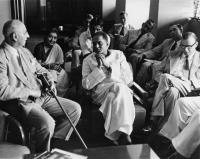As the SS Strathmara steamed into Bombay harbour a large notice, 'Welcome! MRA Reception', became visible, and standing below it could be seen the Mayor of Bombay and most of the Bombay inviting committee. On the day after arrival a two-hour press conference resolved itself into a violent debate on Moral Re-Armament between the journalists present, with Buchman, according to his secretary, 'in one of his smiling, silent frames of mind, sitting happily in the cross-fire'.6
The opinions being expressed mirrored India's condition, five years after Independence and four since Gandhi's assassination. The unity achieved in the freedom struggle and around the personality of Gandhi had disappeared, and the spirit of Gandhism was waning. Nehru was his political heir; but no one had inherited his moral mantle. A Congress Party leader told Buchman, 'We have not ten men in Parliament with the old idealism. Independence hasn't solved our problems. No one wants to go back, but we don't know how to go forward.' Communism had attracted many intellectuals, if only because it was what those they considered their age-old exploiters disliked most: some wrote off Buchman and his colleagues as 'anti-Communists', others simply felt opposed to all 'Western ideas', good or bad.

Buchman gave his views in private: 'In a materialist ideology the ultimate authority is a man or a party line, a human will, and the ultimate basis for change is force. In a moral ideology the ultimate authority is God's will and the basis for change is consent.' But at this press conference he said little, because he felt that, at that moment, only the plays he had brought could convey what he wanted to say to Indian hearts and minds. The first night of Jotham Valley started the ball rolling. Morarji Desai, then Chief Minister of Bombay State, surprised everyone by admitting from the stage after it that he had seen a likeness between himself and the self-righteous elder brother in the play. Next day a journalist, who had been violently critical of him, thanked him and asked if they could meet.
Socialists like J. P. Narayan, who had separated from Gandhi to follow a Marxist path but were now looking for new ideas, talked at length with the visitors. In co-operation with Socialist trades union leaders like Purshottam Tricumdas, the founder of the Socialist Party, and Congress-inclined unions like H. N. Trivedi's cement workers, they called huge meetings to hear Buchman and other speakers.
413
Photo: Buchman (left) with J.P.Narayan, leader of the Praja Socialist Party of India.
©David Channer/MRA Productions